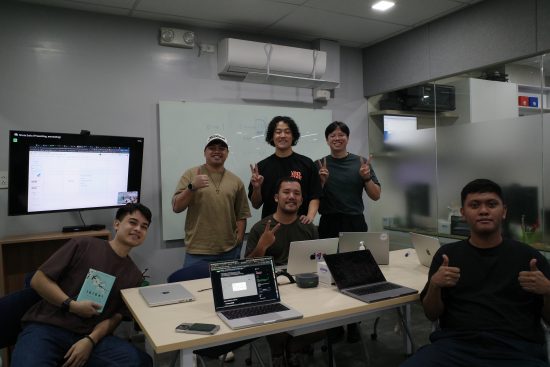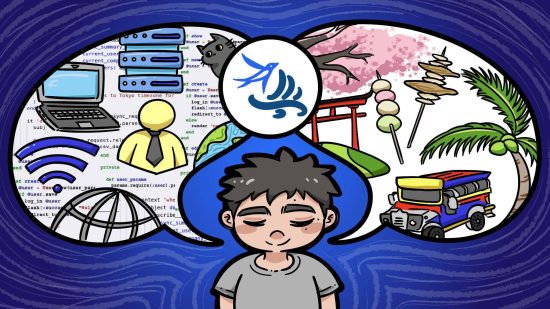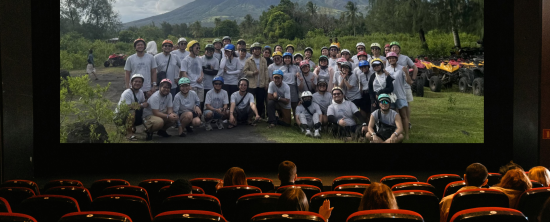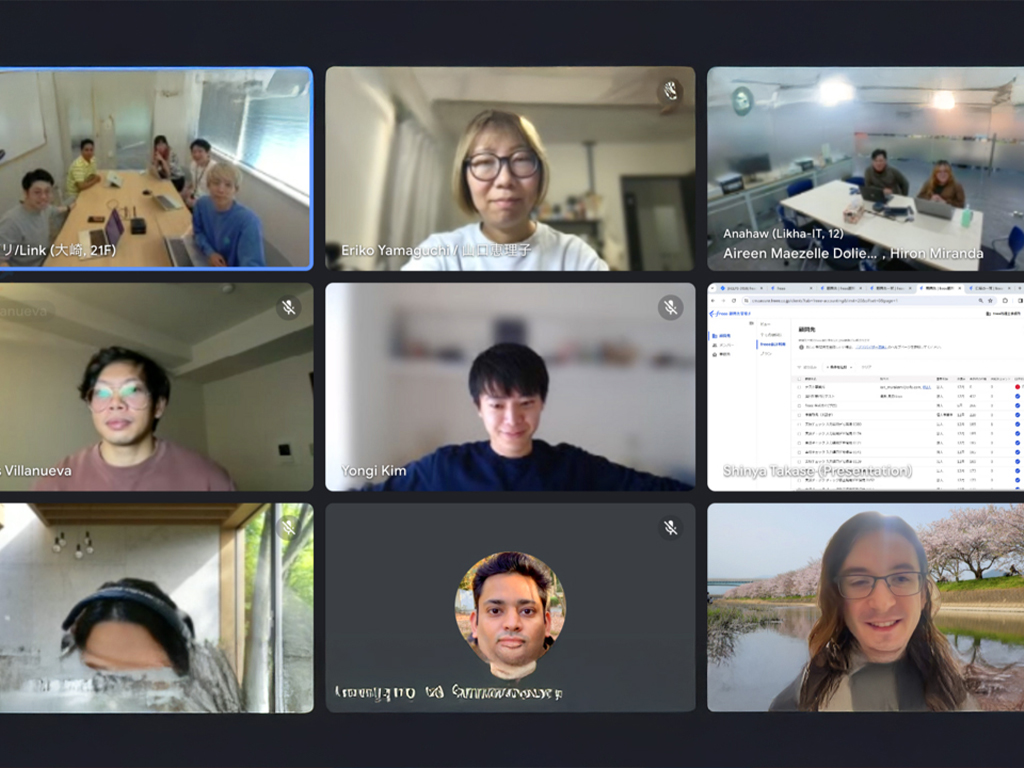
Experience and efforts in Global team development
- TECH BLOG
- Ryota Ikezawa
My name is Ryota Ikezawa . I joined freee in November 2015. Due to my long history with the company, I can say I have gained experience in various teams such as the Core Engine team and financial development team. I have started working in development on the Global team since July 2022.
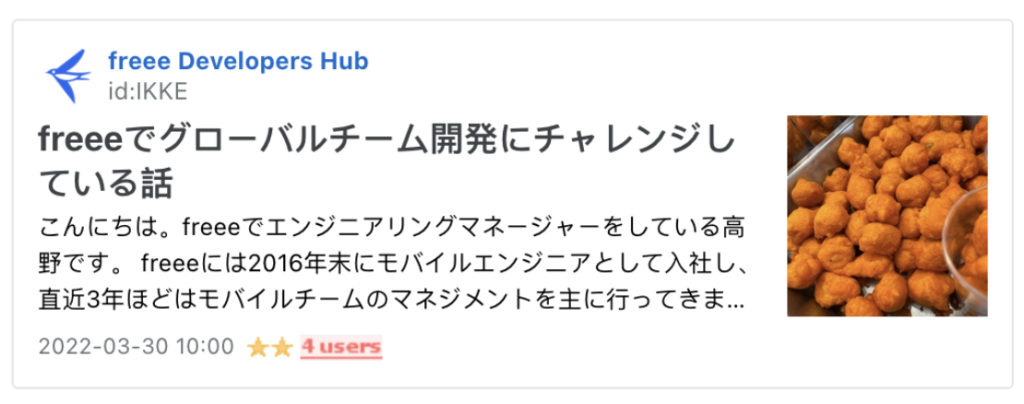
Satoshi , who wrote the article about the Global Team, is also my manager now.
Joining the Global team
In July 2022, I joined the Global team using our internal transfer system called “Transfer Sengoku.” Embracing challenges in new environments is a regular pursuit for me, as I believe growth thrives outside comfort zones. Initially, I faced hurdles with English proficiency, but recognizing the opportunity it presented, I embraced the challenge of joining a Global team.
Projects and Transformations
We embarked on three specific projects:
Data conversion service project / September 2022 – February 2023
Initially involved in the “Project Management team,” I transitioned to the launch of the “freee data conversion service” after two months. Despite it being my first experience in development within a Global team, I found that while languages differed, fundamental engineering challenges remained consistent, fostering seamless communication. I contributed to the service’s development from September, leading to a beta release in December and an official launch in February.

Although my English hadn’t improved much, I was able to keep up with daily conversations. Since we often discuss topics based on codes, I carefully wrote pull request descriptions to accurately convey my intentions, and intentionally increased the number of code comments. It was particularly difficult to explain Japan’s unique domains to other Global members.
Remodeling and implementation to eliminate technical debt / March 2023 – July 2023
After the official release of the “freee data conversion service”, I participated in the “freee client management beta” project. However, there was a data model problem that needed to be solved, and so I started working on this first. Although the problem has existed for over five years and was complex with many internal issues, it was an essential project for providing services to tax accountants. We solved the problem with the help of 3-4 members and other teams.
From player to manager / April 2023 to present
I am currently involved in “freee client management beta” and the team name is udon. At the same time as the debt cancellation mentioned above, I was also involved in establishing this team and developing a new application.
Since I was working on both projects at the same time, I felt that there was probably more I could have done to launch the team.
The team consisted of about 10 people including myself, and the service we developed was released in November 2023. Here is a screenshot of us celebrating our release.
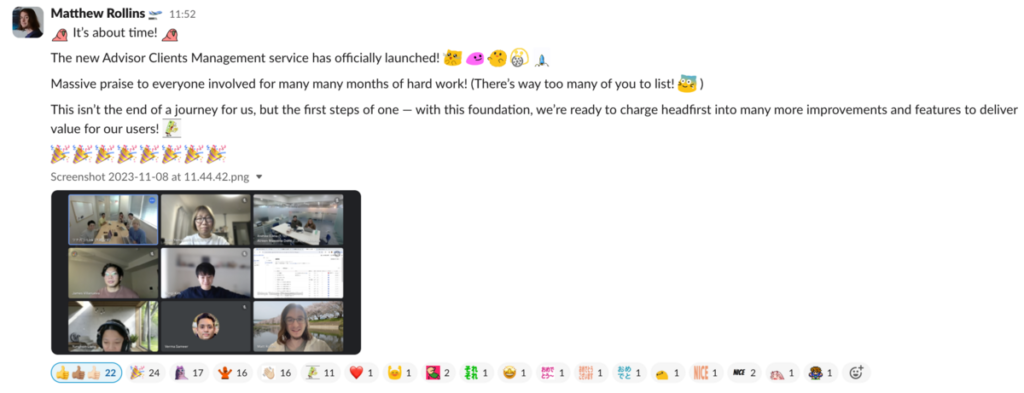

Currently the team is managed by Matthew Rollins , and we are currently considering the future direction of the team. We are looking for a format that gives members discretion and allows them to work autonomously, similar to The POD Model. Our entire team is committed to this approach, and we continue to pursue this direction post-launch.
The POD Model of Software Development – [x]cube LABS
My level of English has improved considerably since back when I was a player, but I still find it difficult to express my intentions flexibly and accurately. Words are very important in managing a team, so I try to increase the number of points of contact with members and teams as much as possible and communicate carefully.
Personal Insights
Lastly, I would like to write my honest impressions after working in a Global team for about a year and a half.
Challenges in working in a Global team
Needless to say, language is the most difficult thing to learn. Although I have been learning the English language for a long time, I have not had much time to be interested in the cultural background of this language.
Not only language is important, but the culture and customs adjacent to that language are equally important. In addition to simply learning vocabulary and grammar, you are required to have a deep understanding of the cultural background behind how words are used and expressed.
For example, when using the word “should” with someone, it is essential to be mindful of the intent and situation. Even if an expression follows common grammar rules, whether or not it is culturally acceptable requires looking at it from another perspective.
Overall, it is important to understand the other person’s point of view and culture. Even if the language changes, the basic approach to communication should remain the same, but I feel that I need to pay more attention to language and culture than ever before.
Improving my English skills and increasing confidence
When I expressed my concern that my English wasn’t good enough, I was once encouraged by a colleague:
“Because you can understand the meaning of this, right? It means you can communicate with us.”
These words gave me both encouragement and joy. It is true that my English skills still have a lot of room to improve, but I am working hard to learn English while doing my job. As a manager, it is essential to speak proactively and provide feedback to members, so the opportunity to actually speak can increase.
With the increase in my opportunities to speak, the challenge of speaking became less daunting than before, and I gradually gained confidence in my ability to do so.
“freee client management” development
Here is the team structure of my current team:
- Development: 80% from Japan, 20% from the Philippines (I am the only Japanese person)
- Product Designer
- QA engineer: 50% from Japan, 50% from the Philippines
There is only one Japanese person on the development side, including myself, and the main communication is done in English.
This means that all documents are written in English. In addition, for each project, we determine the DRI *1 and proceed with the project.
Since the release of the service has been completed, I have started to develop the following application operation rules:
- Bug hunter system (response to inquiries/triage and high-priority fixes, rotating system)
- Deployment owner (daily)
We value a team culture in which team members immediately share any problems they feel through channels and work on development autonomously, so I feel that development is going very smoothly at this stage.
Additionally, each member has already started creating DesignDocs *2 .
What I want to do from now on
- Developing a process for responding to inquiries (enabling team to respond to inquiries even when support is only available in Japanese, and wont allocate work based on language)
- Establish a structure to deal with incidents
- Build a team where all members have ownership
The udon team is currently exploring what the team should be aiming for. Now that the service release has finished and everything has calmed down, I’m currently trying out team management like The POD model. Our goal is to be more productive as a team and to enable members to autonomously provide “Maji-kachi (real value)”.
While traditional organizational structures have a clear line of responsibility, they have the weakness of making it difficult for members other than those in charge to take ownership. In other words, you cannot view the business you are involved in as “your own business.” As a result, quality of PDCA cannot improve, small changes are overlooked, and performance gradually deteriorates. On the other hand, with the POD model, members have a great deal of discretion and a high degree of freedom, which creates the environment for people to view business as their own business. Accumulating a sense of personal responsibility improves the quality of the PDCA cycle and becomes the driving force that brings the project closer to success. In addition, even if a business fails (withdraws), the experience gained from it has meaning and it encourages members to grow and develop the know-how.
I will continue to work hard to provide the best products as fast as possible while creating synergies by combining freee’s strong culture and the Global team.
*1 : Directly responsible person: assigns DRI to all projects and is responsible for success and failure of the project
*2 : A type of design specification used by Google etc.

